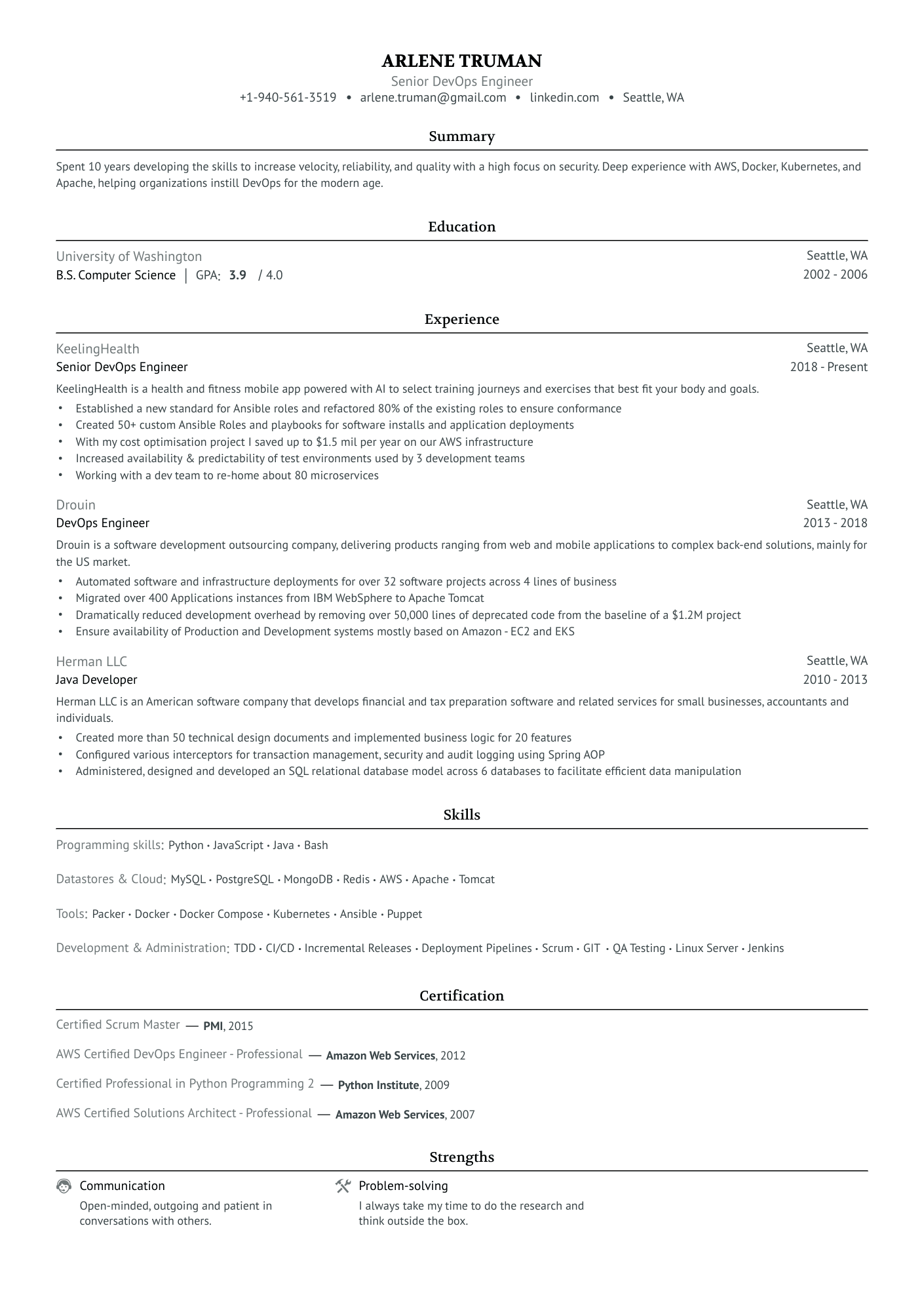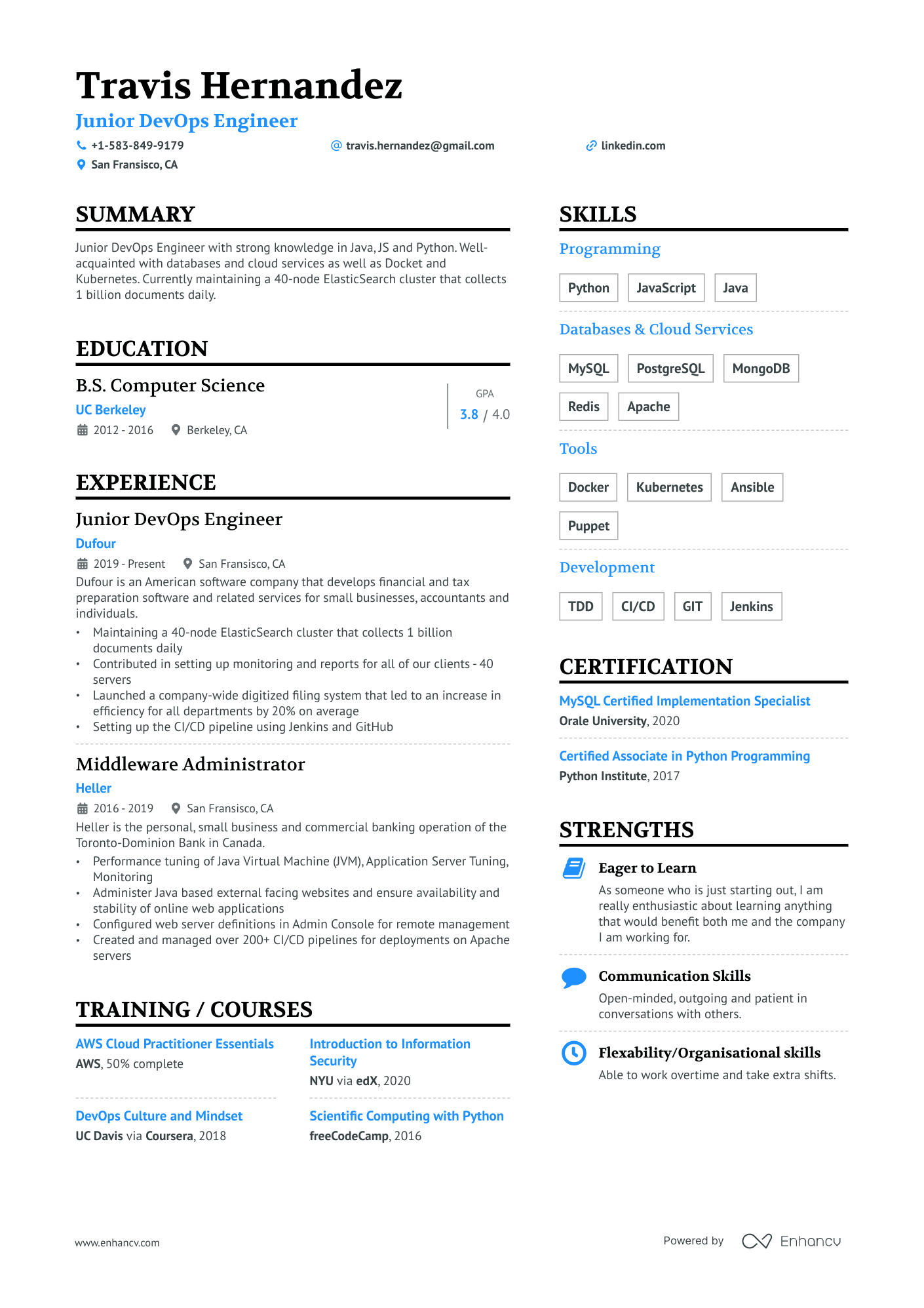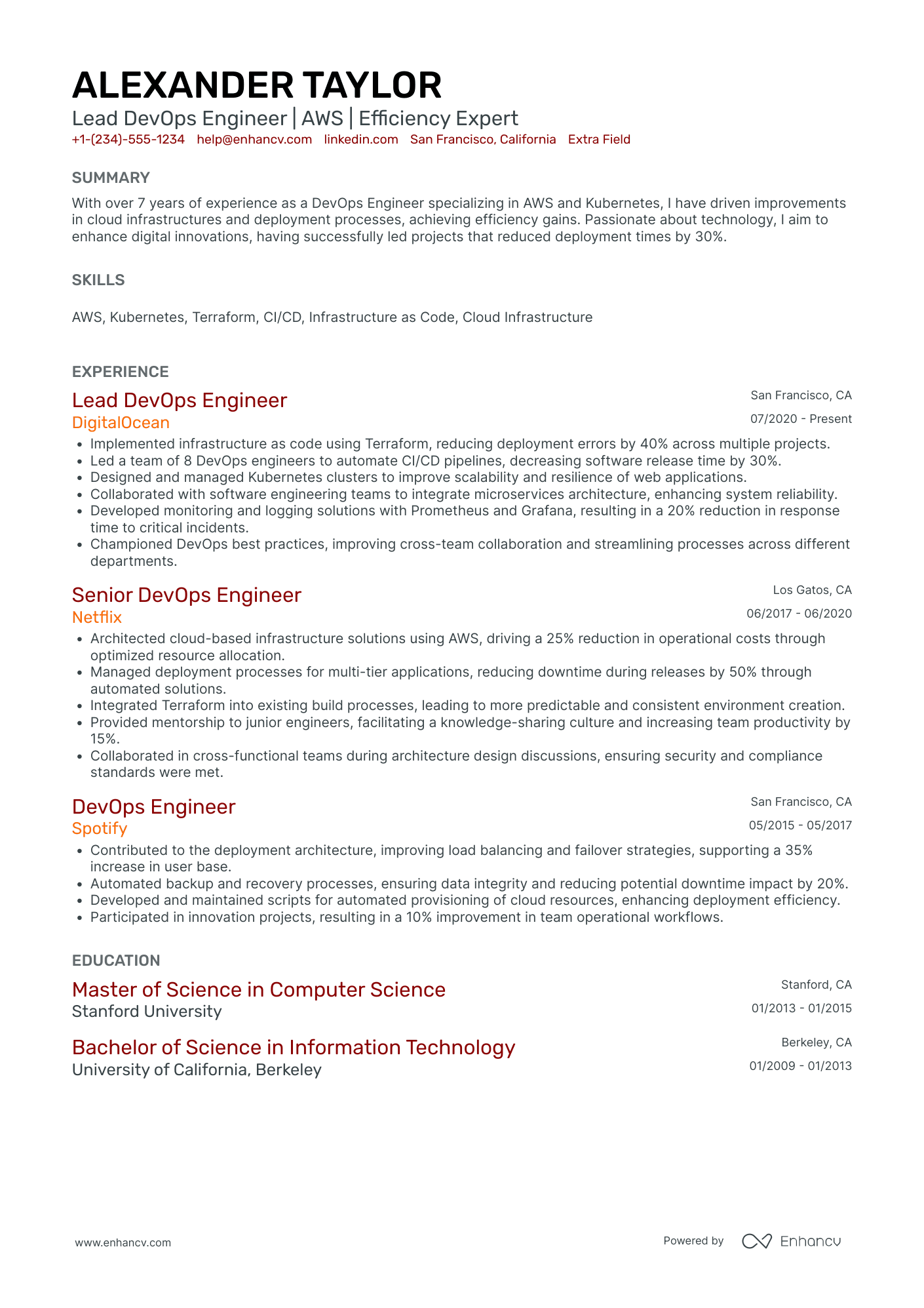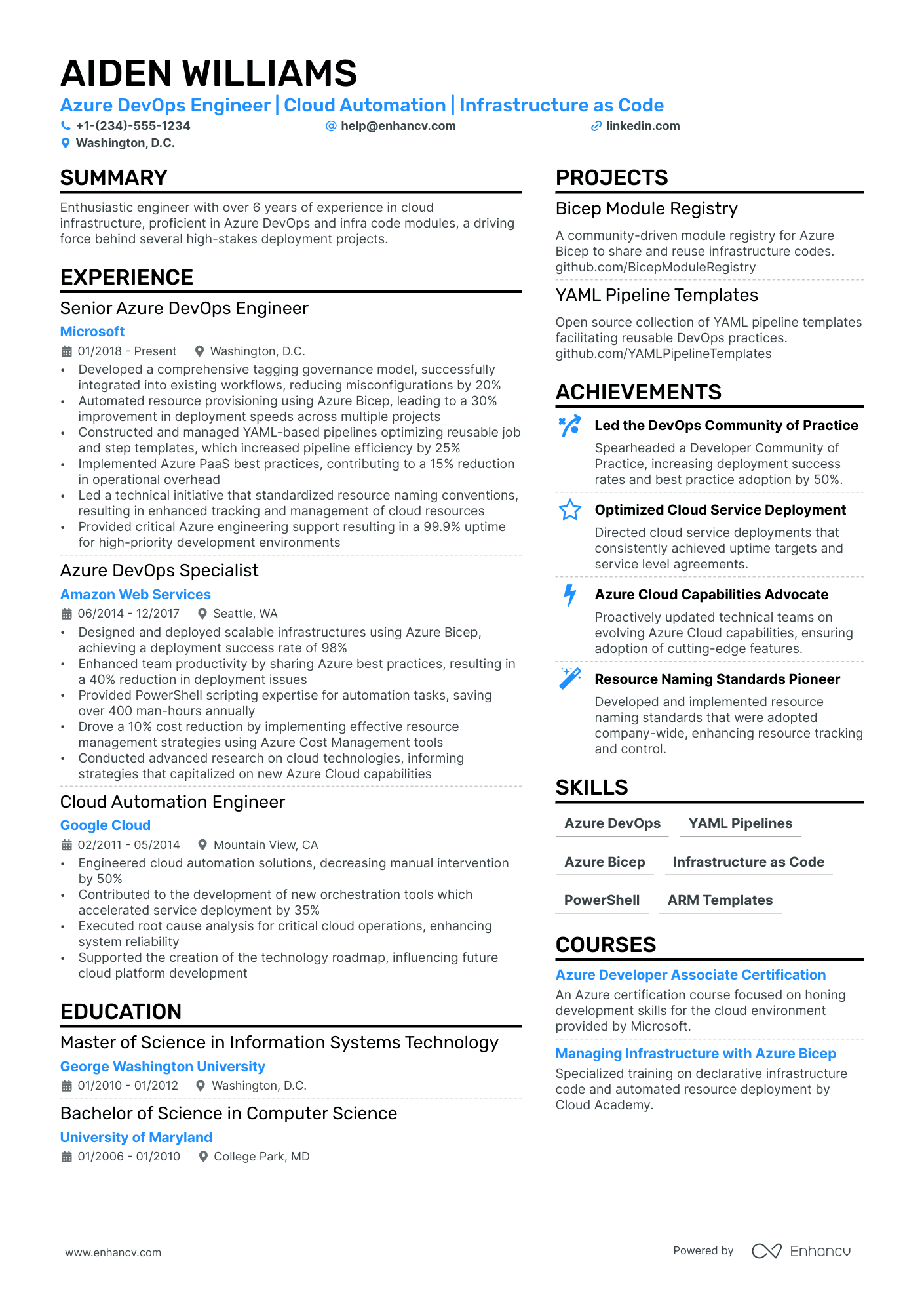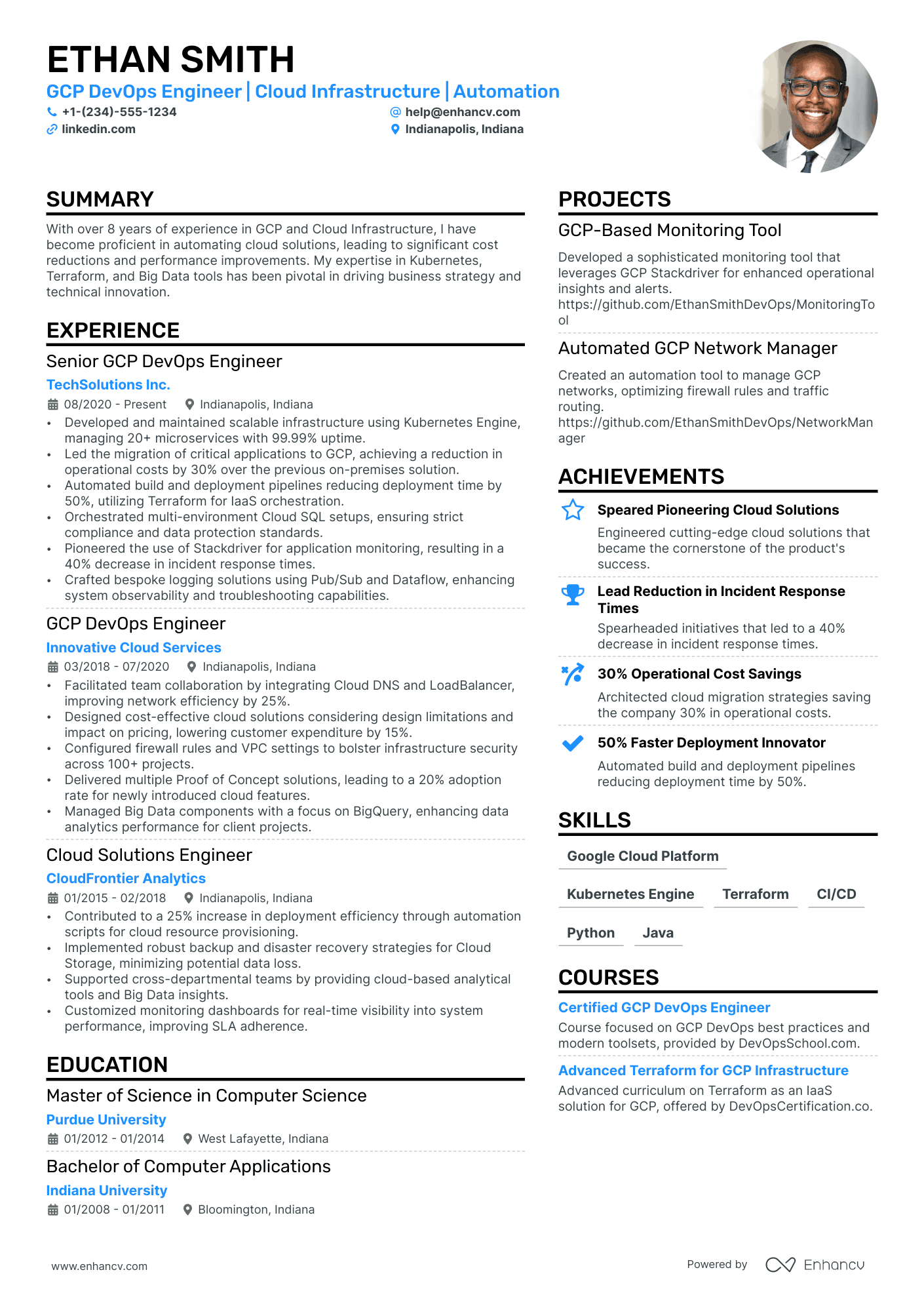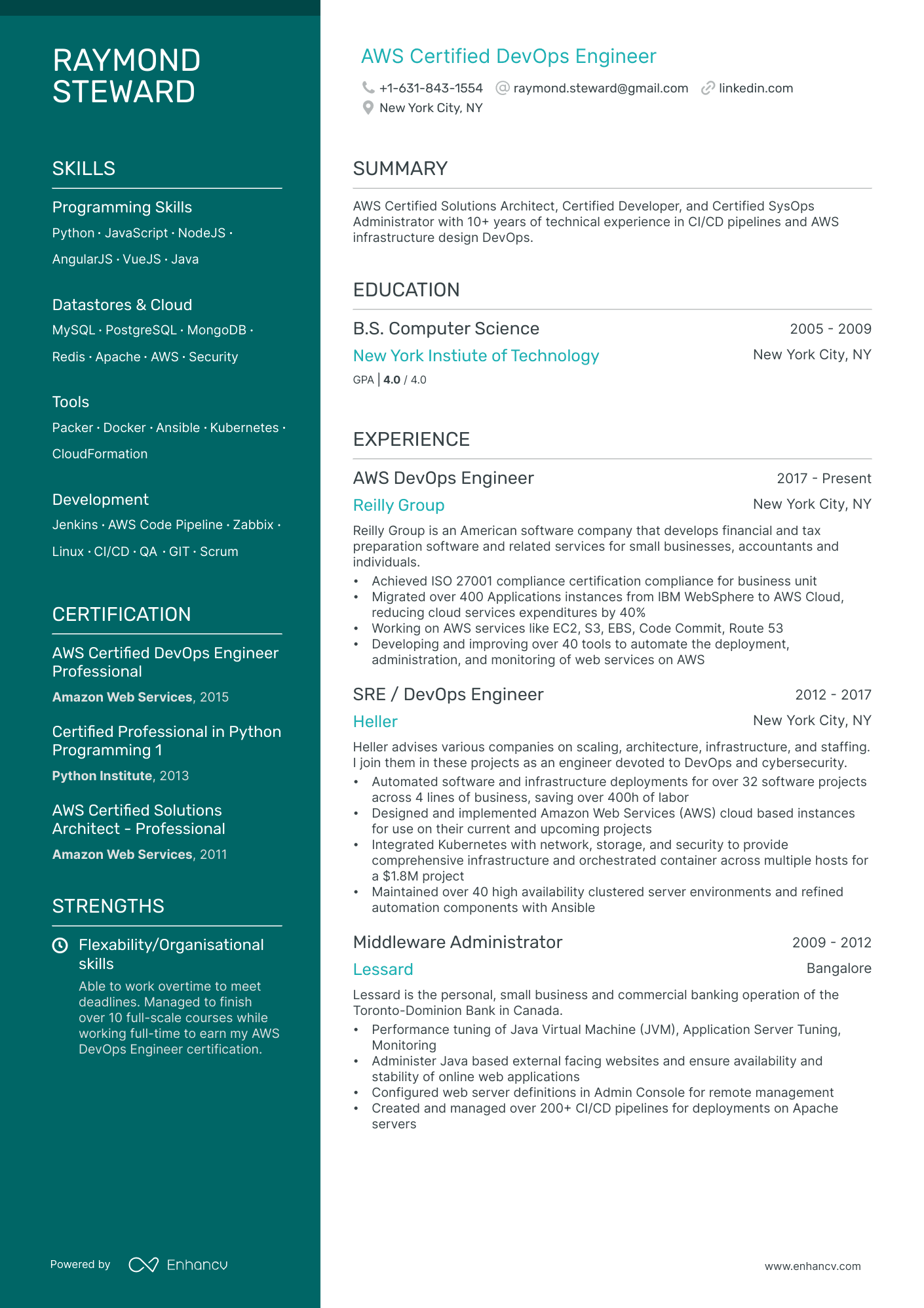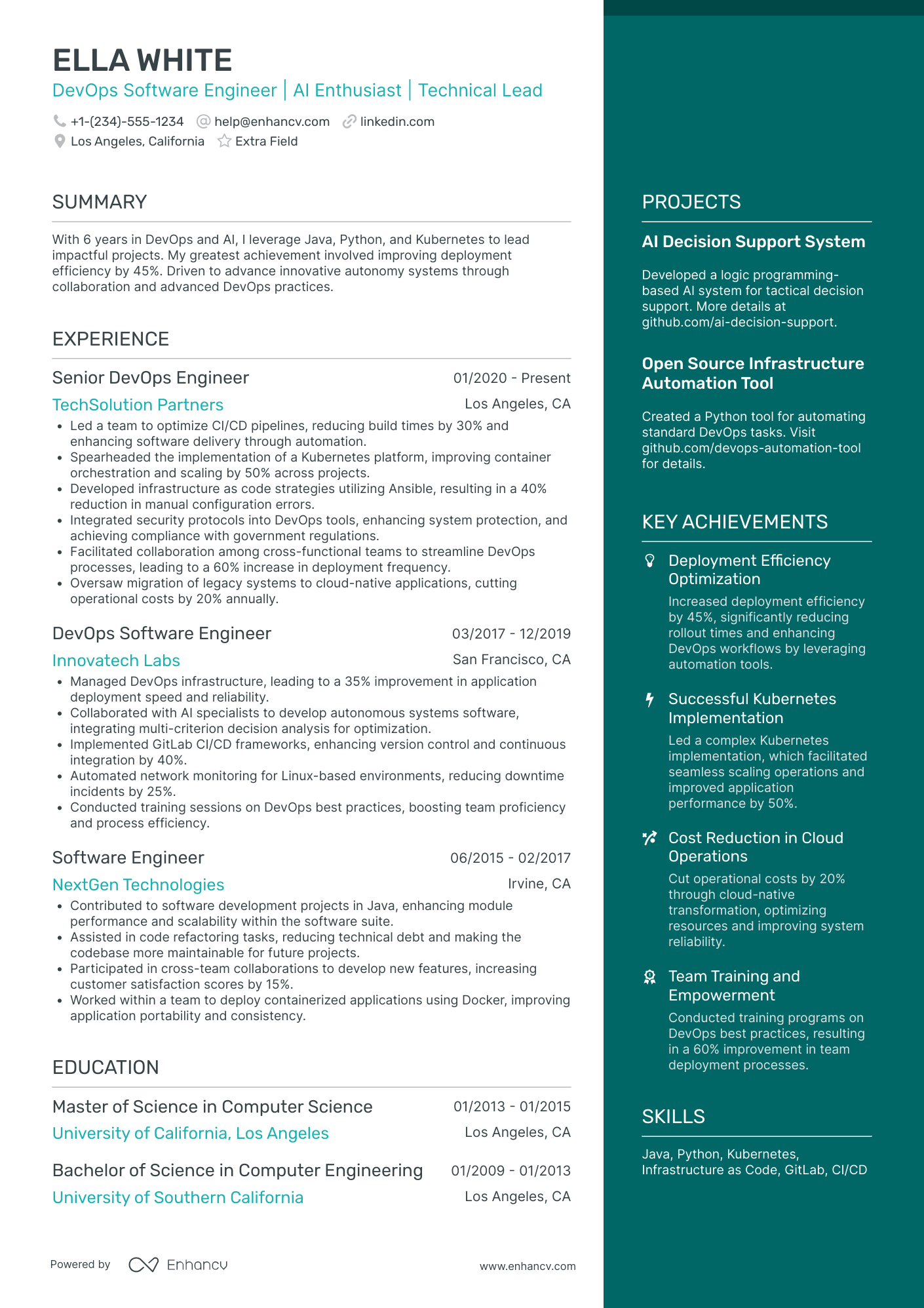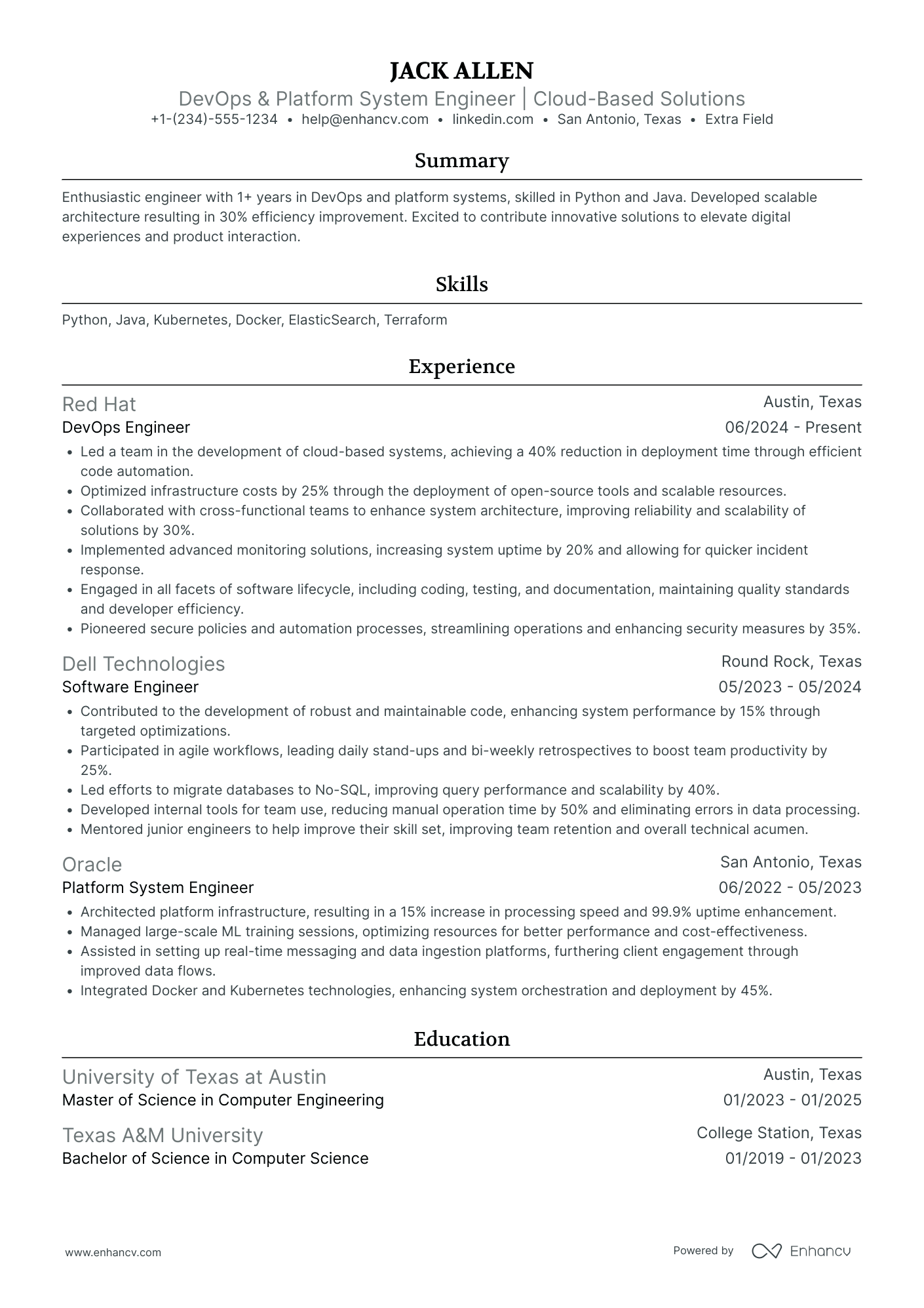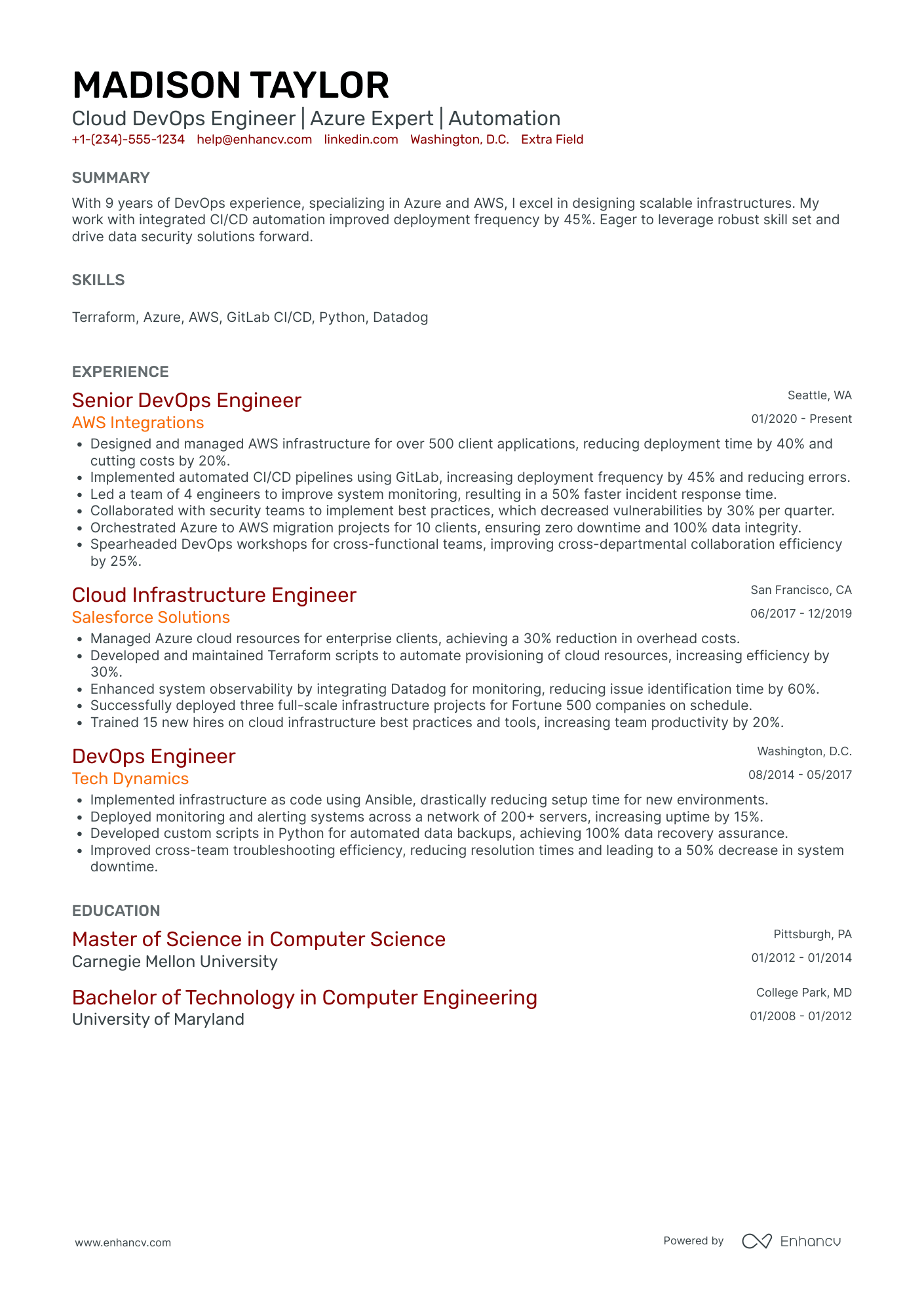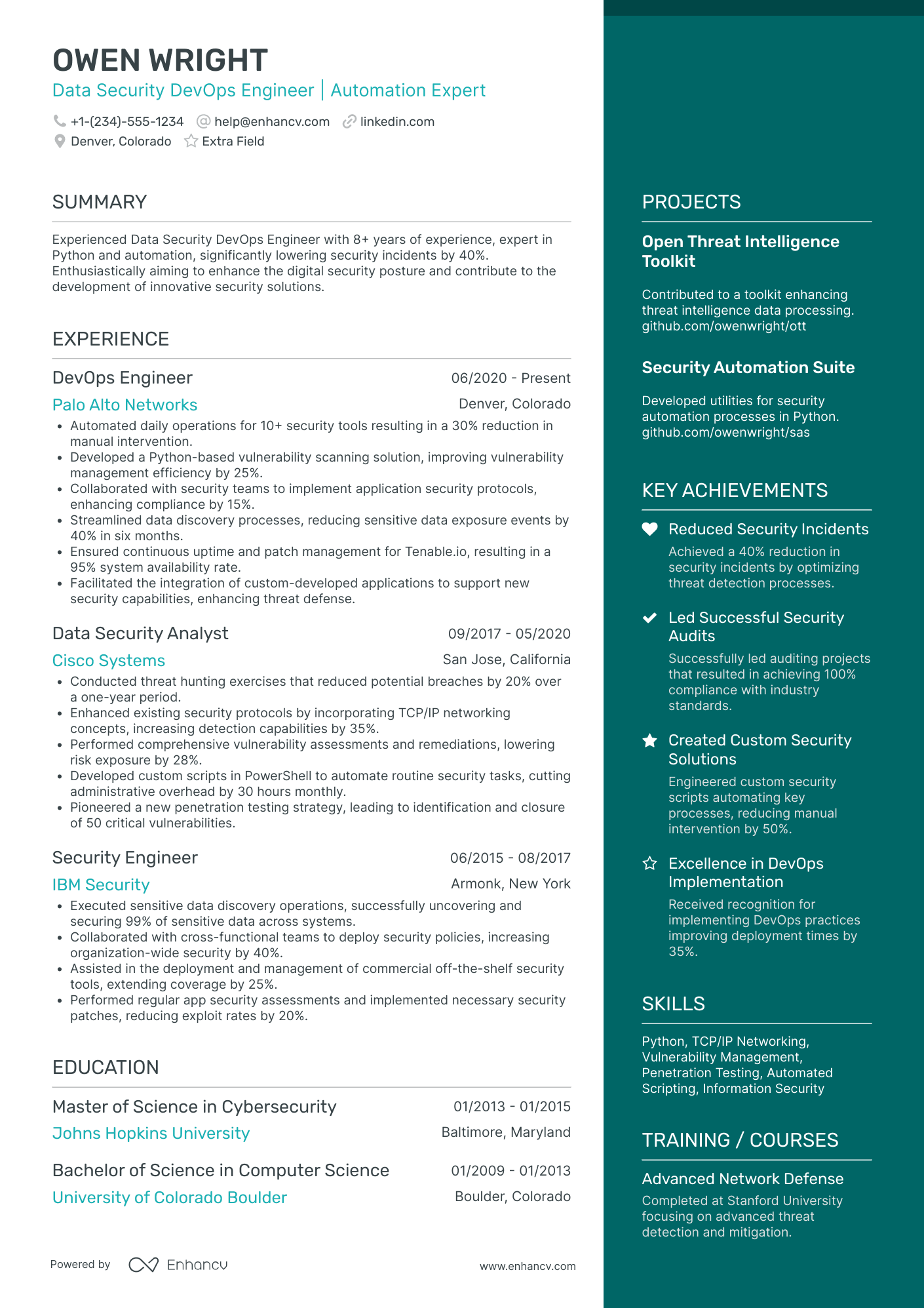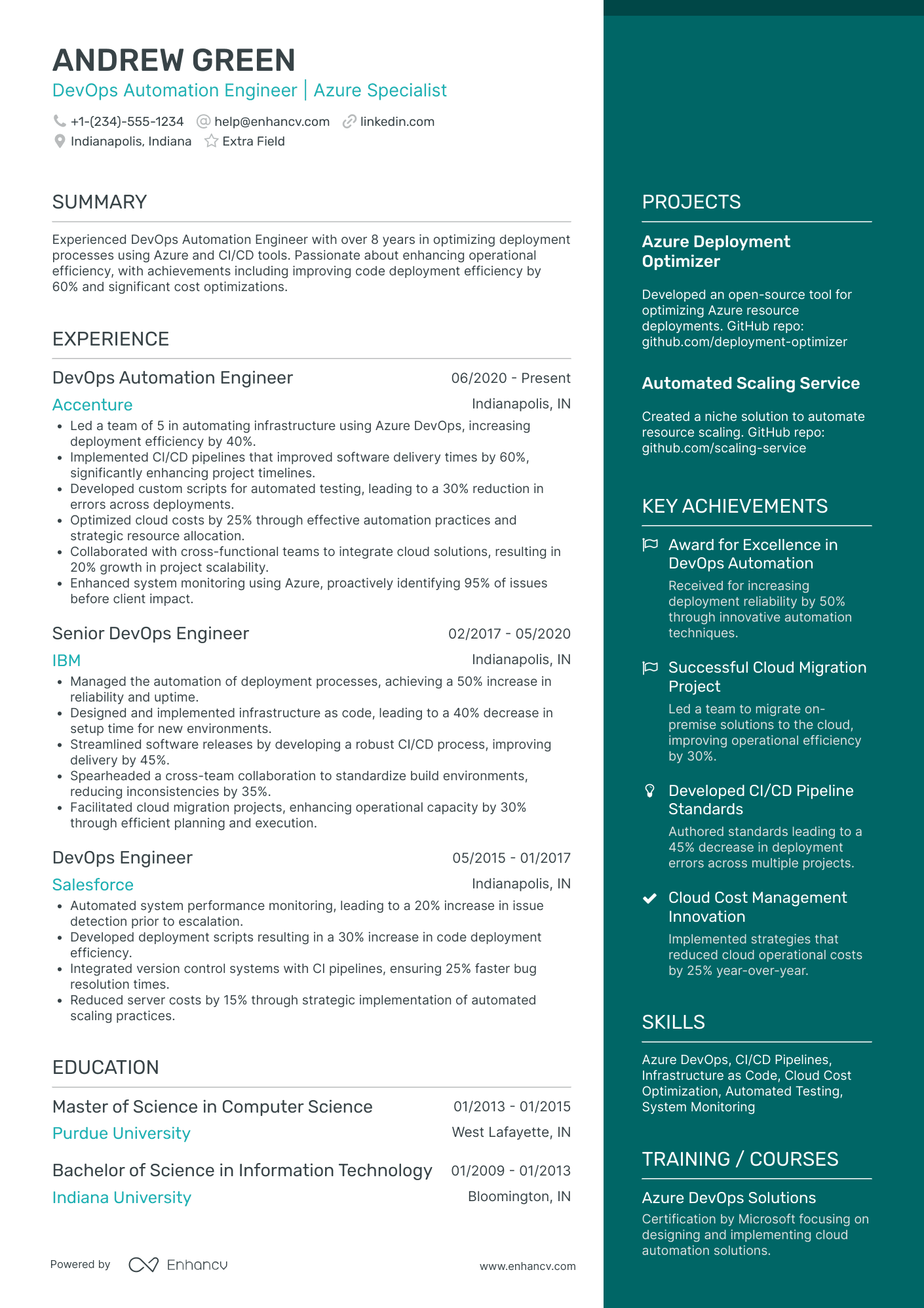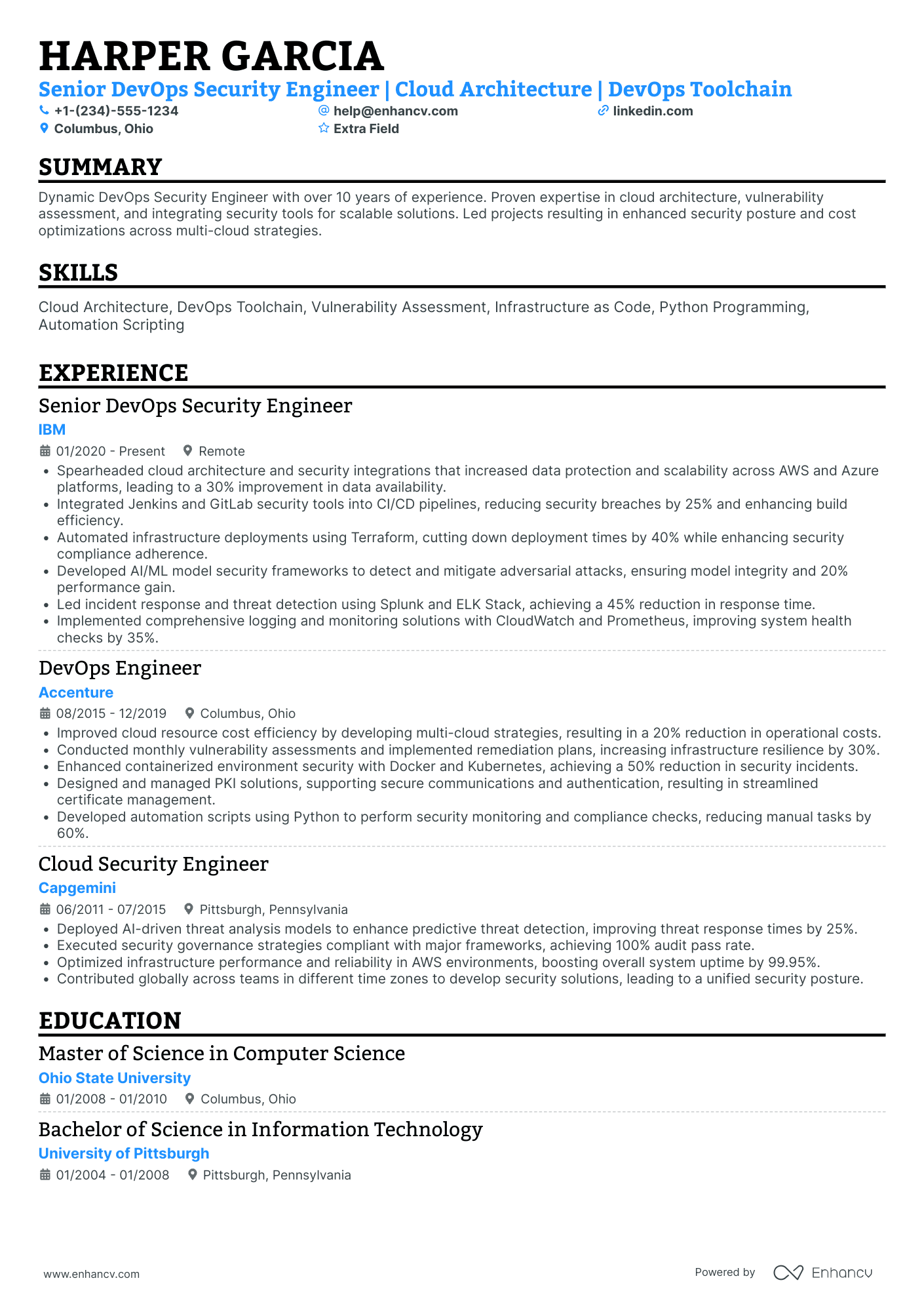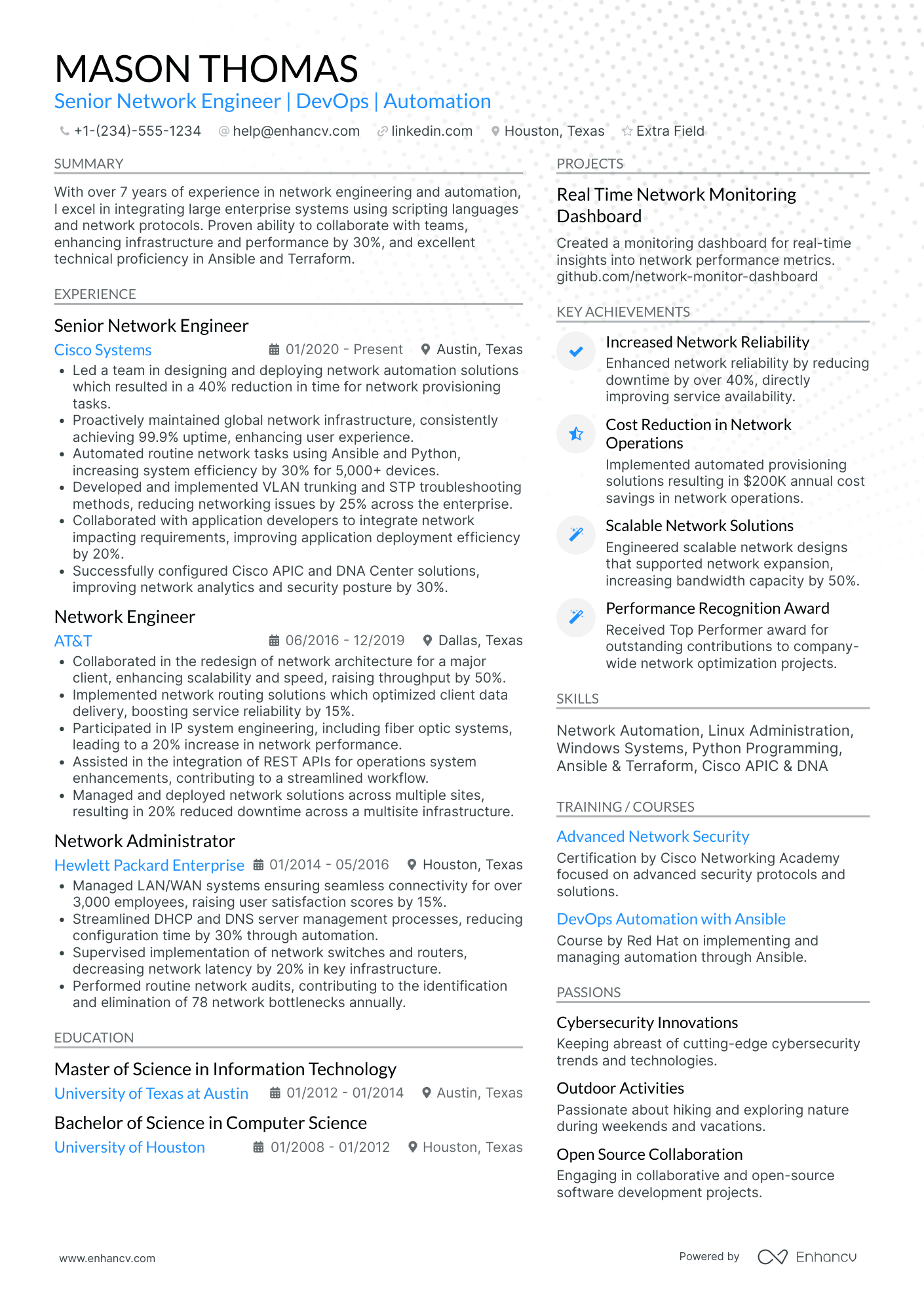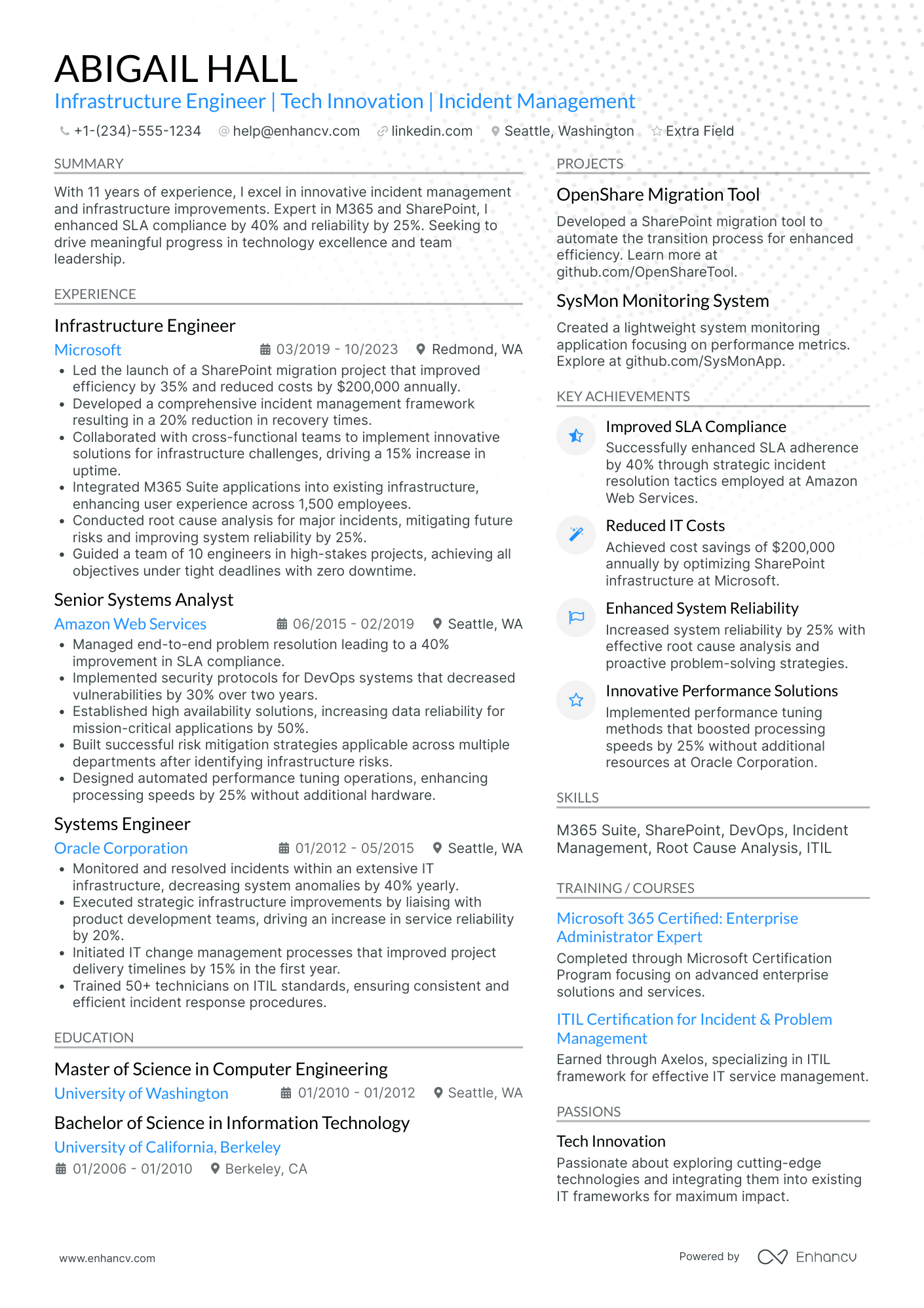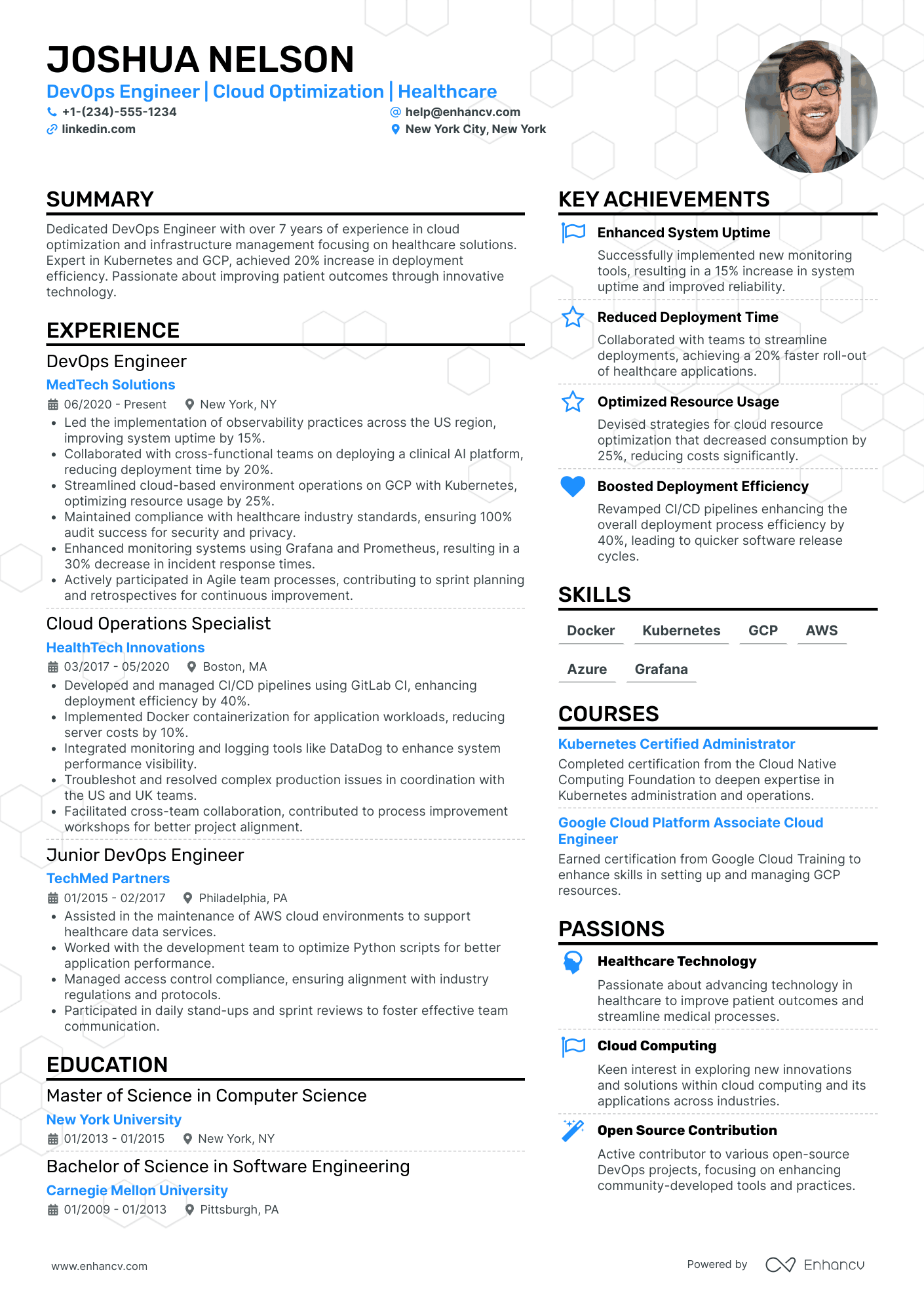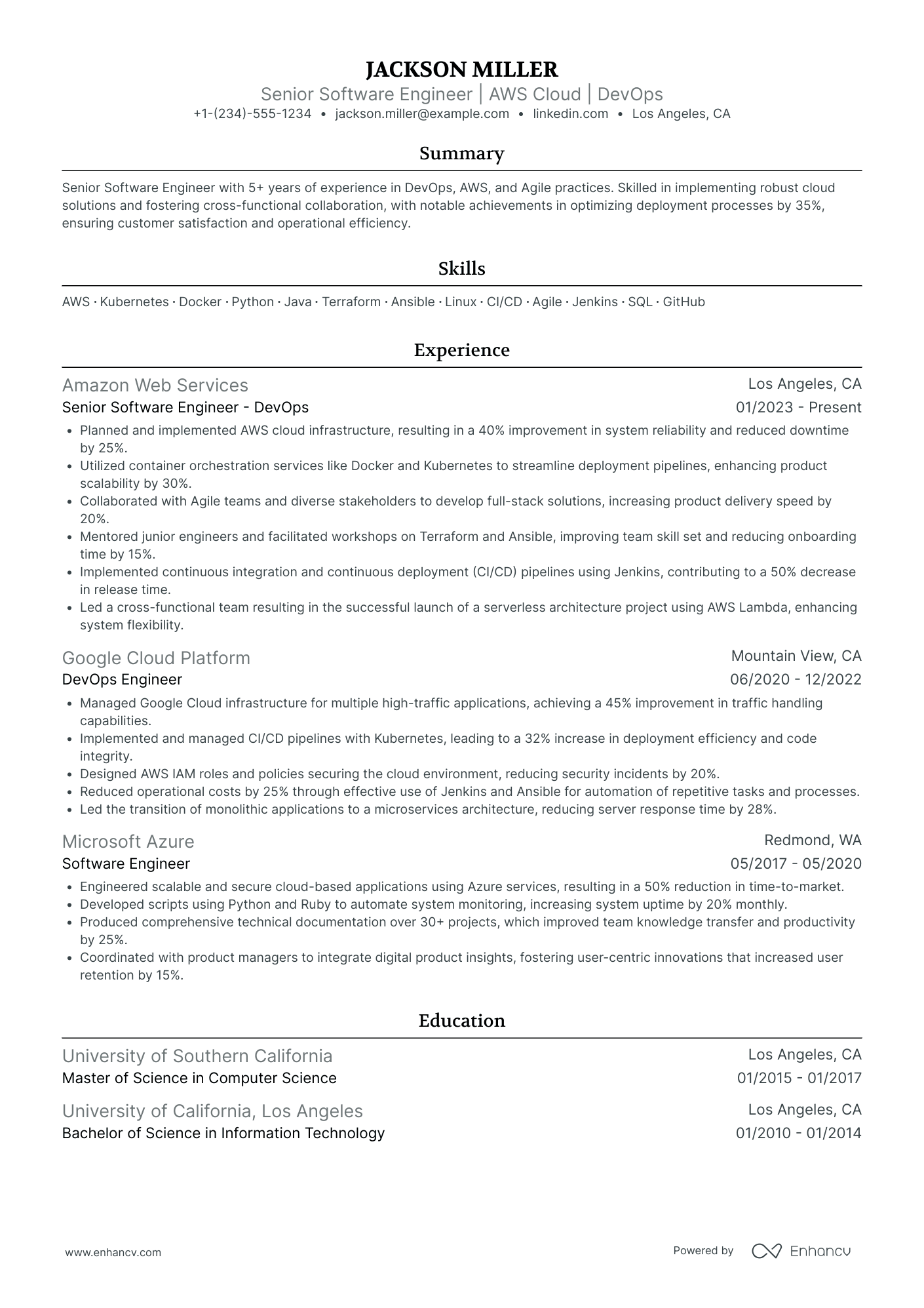Showcasing your expertise on a DevOps engineer resume can feel like a balancing act.
You need to demonstrate technical proficiency in a wide range of tools and technologies as well as highlight your ability to collaborate across teams.
The challenge lies in effectively communicating deep technical knowledge without overwhelming the reader with jargon or overly technical details.
In this guide, you’ll learn:
- How to format your DevOps engineer resume so hiring managers will see your technical expertise and organizational skills immediately
- How to quantify impact with measurable results so companies know they can expect positive outcomes
- How to present the right combination of skills to show your up-to-date industry knowledge and increase employability
- How to write a DevOps engineer resume summary that makes a strong impression and introduces your value in the industry
For examples of resumes in similar roles, explore our selection below:
DevOps Engineer resume examples
By Experience
Senior Devops Engineer
Junior Devops Engineer
Lead Devops Engineer
By Role
Azure Devops Engineer
GCP Devops Engineer
AWS Certified Devops Engineer
Devops Software Engineer
Devops System Engineer
Devops Cloud Engineer
Devops Data Engineer
Devops Automation Engineer
Devops Security Engineer
Devops Network Engineer
Devops Infrastructure Engineer
Principal DevOps Engineer
- Clear and Structured Presentation - The resume is organized in a coherent manner with distinct sections such as experience, education, skills, and achievements, making it easy to navigate. Each section is well-labeled and contains concise information, helping the reader quickly understand the candidate's qualifications and expertise.
- Strong Career Growth within the Healthcare Industry - Joshua's career progression from a Junior DevOps Engineer to a DevOps Engineer highlights a clear trajectory of growth and increasing responsibility. His focus on healthcare technology underscores his consistent interest and specialization in this industry, showcasing dedication and depth of experience.
- Extensive Use of Advanced Tools and Methodologies - This resume stands out with its in-depth technical proficiency, showcasing expertise in leading tools and methodologies. It lists specialized skills in Docker, Kubernetes, GCP, and Azure, evidencing the candidate's capability to manage intricate cloud environments, particularly suited to the healthcare sector.
DevOps Release Engineer
- Logical Structure and Clarity - The resume is well-structured with clearly defined sections, presenting each aspect of the candidate's experience in a logical sequence. This clarity ensures that the reader can easily navigate through different parts, such as experience, education, skills, and achievements, gaining a comprehensive understanding of the candidate’s capabilities and career progress.
- Dynamic Career Progression - The career trajectory of Jackson Miller showcases a steady advancement from a Software Engineer to a Senior Software Engineer position at prestigious tech companies like Microsoft, Google, and AWS. This progression indicates not only his technical prowess but also his ability to adapt and excel in diverse environments within the cloud and DevOps space.
- Industry-Relevant Technical Expertise - The resume emphasizes the candidate’s proficiency in cutting-edge tools and methodologies such as AWS, Kubernetes, Docker, and Terraform. These tools are critical in current cloud computing and DevOps landscapes. This specific expertise underscores his ability to deliver complex, scalable solutions that are aligned with industry demands.
How to format a DevOps engineer resume
Your DevOps engineer resume must demonstrate technical expertise from the very beginning. The format is the first thing recruiters notice when they look at a resume and is your first opportunity to make a good impression.
Demonstrate your technical abilities by creating professional, organized sections. Here are a few key areas to review when formatting your DevOps engineer resume:
- Reverse chronological layout - this resume style focuses on your work history in a reverse chronological timeline. Show how you’ve developed expertise in new technologies and completed automation projects throughout your career.
- Header - the top of your resume should include a brief and clear header that provides professional contact information and a link to your online profile or portfolio. Including a URL to your LinkedIn profile or portfolio will give employers a detailed view of your career and projects.
- Key achievements - industry achievements demonstrate a proven track record and up-to-date knowledge in the rapidly evolving tech industry. Demonstrate how your work as a DevOps engineer reduced downtime, improved system reliability, or sped up software deployment cycles.
- Limit to one page - you might have enough experience with cloud platforms and automation tools to fill pages, but recruiters are busy and don’t have time to waste on lengthy resumes. Include only the strongest and most relevant information on your DevOps engineer resume and tailor every section to fit your target job.
Ensure preservation of formatting and added security by using a PDF file format instead of Doc. Incompatible or corrupted files won’t help you land a job that requires strong technical knowledge.
For help getting started, use Enhancv’s resume builder to easily edit an ATS-friendly DevOps engineer resume template and download a PDF that passes through Applicant Tracking Systems.
Different markets have specific resume formats – a Canadian resume could vary in layout.
Is your resume good enough?
Drop your resume here or choose a file. PDF & DOCX only. Max 2MB file size.
The top sections on a DevOps engineer resume:
- Technical skills showcase expertise in various DevOps tools and languages: Essential for demonstrating proficiency in key technologies.
- Work experience highlights previous roles and achievements in DevOps: Reflects practical experience and successful project implementations.
- Education and certifications emphasize formal training and qualifications: Indicates foundational knowledge and commitment to professional development.
- Projects section details significant contributions to DevOps initiatives: Offers concrete examples of skills applied in real-world scenarios.
- Professional summary introduces the candidate's DevOps career and goals: Provides a snapshot of experience and aspirations, setting the stage for the resume.
What recruiters want to see on your resume:
- Proficiency in automation tools and scripting languages: Enables efficient management of infrastructure and deployment processes.
- Experience with cloud platforms and services: Crucial for modern, scalable, and resilient system architectures.
- Understanding of CI/CD pipelines and version control: Key for implementing continuous integration and delivery practices.
- Knowledge of containerization and orchestration technologies: Important for developing and managing microservices-based applications.
- Demonstrated ability in system monitoring and incident management: Essential for maintaining high availability and performance of services.
How to write your DevOps engineer resume experience
Your resume experience section is where you show your work history along with accomplishments from each job. Each role should include 3-4 bullets highlighting your top achievements.
DevOps engineers often struggle with effectively communicating deep technical knowledge without overwhelming the reader with jargon or overly technical details.
The difficulty is in quantifying industry achievements in a way that is meaningful to non-technical hiring managers.
Let’s look at a DevOps engineer resume sample experience section.
- •Developed applications and maintained databases
- •Designed and implemented database model
- •Participated in annual company fundraiser
What doesn’t work in this example:
- Doesn’t quantify achievements - developing applications and maintaining databases are great but don’t mean much without results. As they appear here, hiring managers don’t know whether any of these projects were successful.
- No industry keywords - your DevOps engineer resume needs to include specific tools and technologies to show potential employers that your industry skills are current. Be sure to include industry keywords that show your expertise in specific platforms, services, and languages.
- Irrelevant information - participating in a company fundraiser may speak to certain soft skills, but it’s completely irrelevant as it appears here. Make efficient use of all the space on your resume by only including information relevant to your target job.
Let’s make a few changes and look at an updated version of this experience section.
- •Developed cloud-based applications using AWS and maintained 14 databases while staying under budget
- •Designed and implemented an SQL relational database model that increased productivity by 25%
- •Recognized for outstanding achievement as a Certified Agile Practitioner
What works in this example:
- Uses metrics and numbers - “increased productivity by 25%” and “maintained 14 databases while staying under budget” provide measurable results that show hiring managers exactly what you accomplished
- Shows industry keywords - terms like AWS, SQL relational database model, and Certified Agile Practitioner show industry specific knowledge and improve ATS optimization for your target job
- Includes specific achievements - included specific awards and project outcomes show potential employers how you will impact success at their company
How to quantify impact on your resume
DevOps engineers must translate their technical achievements into business impacts. Potential employers want to see how your practical experience results in successful project implementations.
Quantify the impact on your DevOps engineer resume by using real numbers and data. Showcase project outcomes and efficiency improvements.
Here are a few things to consider when quantifying the impact on your DevOps engineer resume:
- Include the number of servers managed or automated, demonstrating scalability and management skills.
- State the percentage reduction in deployment time achieved, highlighting efficiency improvements.
- Mention the number of containerized applications developed, showing expertise in modern application packaging.
- Quantify the decrease in system downtime achieved, reflecting reliability and uptime enhancements.
- Provide the number of automated tests written, indicating a commitment to quality and thoroughness.
- Detail the percentage increase in system performance, showcasing optimization and tuning abilities.
- Indicate the size of the infrastructure budget managed, reflecting financial and resource allocation skills.
- Report the number of team members led or mentored, demonstrating leadership and team management capabilities.
How do I write a DevOps engineer resume with no experience
Writing a DevOps engineer resume with no DevOps engineer experience can be intimidating. If you’re making a career change or new to the industry, you’ll need to rely on transferable skills instead of work history.
Use the following steps to write an entry-level DevOps engineer resume:
- Choose a functional resume layout
- Focus on transferable skills
- Use additional sections to highlight skill development
- Only include information that is relevant to your target job
A functional resume layout focuses on transferable skills rather than experience. This is a great way to show potential employers that you’ve learned deployment processes, system architectures, and orchestration technologies in other ways.
Don’t pad your experience section with irrelevant jobs just to fill space. Only include roles that are relevant to your target position and focus on transferable skills.
Software engineer, development manager, and other IT positions are all great roles to showcase technical skills.
Even customer service and management jobs can be helpful in highlighting interpersonal and communication skills.
How to list your hard skills and soft skills on your resume
Showing interpersonal skills and technical expertise is crucial to an impactful DevOps engineer resume.
DevOps engineers need the technical skills for continuous integration and deployment, as well as the communication skills for collaboration between development and operations teams.
Skills on your DevOps engineer resume will be in two categories - hard skills and soft skills.
Hard skills are the technical knowledge and abilities needed to perform job duties. Soft skills are the interpersonal and communication skills needed to interact with others.
The main difference in these two sections on your resume is presentation. Hard skills are listed while soft skills include examples.
Look at an example of hard skills on a DevOps engineer resume.
When including specific technologies, tools, and languages, only include those you are confident in. If you’re listing it on your DevOps engineer resume, potential employers will assume you’re proficient.
Be mindful that many companies use Applicant Tracking Systems (ATS) to filter resumes for specific skills. Optimize your DevOps engineer resume for ATS with relevant industry keywords and phrases.
Match the skill 1:1 to the way it’s written in the job description so that it is picked up by ATS, but find a way to include it organically. Copy-and-pasted phrases will be obvious and easily spotted.
Here are a few more hard skills to consider for your DevOps engineer resume.
Best hard skills for your DevOps engineer resume
- Cloud platforms (e.g., AWS, Azure, GCP)
- Containerization tools (e.g., Docker, Kubernetes)
- Infrastructure as Code (IaC) tools (e.g., Terraform, Ansible)
- Continuous Integration/Continuous Deployment (CI/CD) tools (e.g., Jenkins, GitLab CI)
- Version control systems (e.g., Git, SVN)
- Scripting languages (e.g., Python, Bash)
- Configuration management tools (e.g., Puppet, Chef)
- Monitoring and logging tools (e.g., Prometheus, ELK stack)
- Network security and firewalls
- Database management (e.g., SQL, NoSQL)
- Linux/Unix administration
- Virtualization technologies (e.g., VMware, Hyper-V)
- API development and management
- Load balancing and clustering
- Performance tuning
- Storage and backup solutions
- Serverless technologies
- Microservices architecture
- DevOps methodologies and practices
- Agile project management tools (e.g., Jira, Trello)
Soft skills can be open to interpretation and therefore require a bit more of an explanation. Choose a few top soft skills and provide an example so hiring managers know exactly what you mean.
Unlike some more isolated IT roles, DevOps emphasizes collaboration between development and operations teams. Your soft skills section is a good opportunity to highlight collaboration and communication skills.
Let’s take a look at an example of a DevOps engineer soft skills section.
Provide specific examples of measurable results and positive outcomes to support evidence of your claims. Show potential employers how you will impact success with your soft skills.
Here are a few more soft skills to consider adding to your DevOps engineer resume.
Best soft skills for your DevOps engineer resume
- Problem-solving abilities
- Strong communication skills
- Collaboration and teamwork
- Adaptability in fast-paced environments
- Attention to detail
- Time management and prioritization
- Critical thinking
- Creativity and innovation
- Leadership and mentorship
- Emotional intelligence
- Resilience and stress management
- Decision-making skills
- Customer-oriented approach
- Project management abilities
- Learning agility and willingness to update skills
- Conflict resolution
- Strategic thinking
- Analytical skills
- Empathy and interpersonal understanding
- Patience and perseverance
How to list your certifications and education on your resume
DevOps engineers will typically have a bachelor’s degree in computer science, computer programming, software engineering, or related field. Higher-level degrees like a master’s in a related field can also be beneficial.
Certifications in specific skills and technologies are a great way to keep your resume current and increase your employability as industry trends evolve.
A good education section needs only a few details:
- Name of degree
- Name of institution
- Years attended
Here is an example of a DevOps engineer resume education section.
Similarly, a certification section only needs the name of the certificate and issuing institution.
Let’s look at an example of a DevOps engineer resume certification section.
Keeping your industry skills current by gaining new certifications shows a commitment to your role and up-to-date knowledge.
Always update your resume to reflect your most current skills as you continue to develop them throughout your career.
Here are a few additional certifications to consider for your DevOps engineer resume.
Best certifications for your DevOps engineer resume
How to write your DevOps engineer resume summary or objective
A DevOps engineer summary or objective is a great way to introduce yourself as a candidate and highlight your top industry accomplishments in 3-4 sentences.
Though the terms are often used interchangeably, there is a slight difference between a summary and an objective.
A summary is a brief introduction that communicates your position and value in your industry. This is a good option for seasoned professionals with years of experience.
An objective looks to the future and captures what you are hoping to achieve in your new position. Using an objective is ideal for entry-level candidates who have little or no industry experience.
If you have at least some experience as a DevOps engineer, a good strategy is to combine the two by highlighting a top achievement and sharing a goal for the future.
End your summary with a goal you share with your target company. This will show that you’ve done your research and are prepared to provide solutions.
Let’s look at an example of a DevOps engineer resume summary.
What doesn’t work in this example:
- No measurable outcomes - “developed successful programs” doesn’t tell hiring managers anything as everyone’s definition of success is different. Use specific results and achievements to avoid confusion.
- Lacking industry keywords - there is no mention of specific tools, technologies, or languages. Don’t miss the opportunity to introduce your top skills right away.
- Unclear goal - it’s not enough to say that your goal is to get the position. Potential employers want to know how your specific experience aligns with the company’s goal.
Let’s make a few improvements and take another look.
What works in this example:
- Strong introduction - ”Google Cloud Platform Certified DevOps engineer with 6 years of experience” lets hiring managers know right away that you’re experienced and certified in specific technologies.
- Real results - this candidate highlights an industry achievement that “earned $2.3M in revenue” so potential employers know how they will impact success.
- Uses industry keywords - including the terms Python, Bash, SQL, Puppet, and Chef highlight your top technical skills and increase ATS optimization.
Additional sections for a DevOps engineer resume
Everyone’s career path is different. You may have some experiences that helped you develop skills as a DevOps engineer that don’t fall inside traditional work history.
If you have relevant skills, experiences, or abilities that don’t fit the standard categories, consider adding additional sections to your resume.
Here are a few sections to consider for your DevOps engineer resume:
- Projects - as a DevOps engineer, some of your biggest accomplishments are likely previous projects. Show your outcomes from successful projects to showcase your abilities.
- Volunteering - collaboration and communication skills are often involved in volunteer work. Include volunteer experience where you learned soft skills that help you as a DevOps engineer.
- Hobbies - even hobbies and interests can be a great opportunity to develop specialized skills or niche knowledge. Add hobbies that align with the skills needed at your target job.
Key takeaways for writing a professional DevOps engineer resume
Now you’re ready to create an amazing DevOps engineer resume that gets callbacks! Before you start sending it off to job applications, let’s review a few key points.
- Format your DevOps engineer resume with a reverse chronological layout that highlights your experience and shows your technical expertise.
- Quantify impact by showing measurable results from previous projects so companies know how you will achieve success in your role.
- Include a combination of soft skills and hard skills so hiring managers can see you have the technical expertise and interpersonal skills to do the job.
- Show your commitment to the industry and increase your employability by developing relevant skills and keeping your resume up-to-date.
